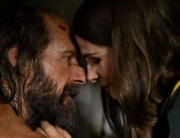The New York Film Festival, with its longtime focus on the international scene, does not have a strong track record of recognizing first-time American feature filmmakers in its posh Main Slate section. One such director that the festival has touted since his debut, Kicking and Screaming, is Noah Baumbach, whose latest effort, White Noise, opened the festival this year. Often directors gain the NYFF seal of approval with roughly their second or third film, such as Barry Jenkins’s Moonlight, Dee Rees’s Mudbound, or Alex Ross Perry’s Listen Up Philip. Sure, there are exceptions, though usually by a filmmaker who is already well known: actors Paul Dano’s Wildlife and Greta Gerwig’s Lady Bird.
It’s as though Film at Lincoln Center, which presents the festival, saves noteworthy films by emerging helmers for its New Directors/New Films series, which it programs with the Museum of Modern Art, in the spring. That’s not to say that the programmers have overlooked first timers this year. Landing in the main slate is Aftersun, by Scottish director Charlotte Wells, and from France, Alice Diop’s Saint Omer—though she is already an award-winning documentary filmmaker. But is the festival slowly changing on that score for domestic directors? (Lila Neugebauer’s well-crafted debut Causeway, starring Jennifer Lawrence, would have added to luster to any lineup, not to mention star power.)
One welcome sign of change is Elegance Bratton’s visceral debut, The Inspection, inspired by the director’s basic-training experience in the U.S. Marine Corps. (He was in active service from 2005 to 2010.) It is noteworthy that the movie was selected as this year’s closing night pick: Both its writer/director and lead actor are openly queer Black men.
Jeremy Pope stars as Ellis French, a 27-year-old homeless gay man living in Trenton, New Jersey, in 2005. After a five-year estrangement, he knocks on the studio apartment door of Inez, played by Gabrielle Union in the sharpest turn of her career, as his somber and unforgiving mother. In a visual manifestation of the overarching son/mother conflict, her overstuffed apartment is decorated with all kinds of Christian imagery—her rigid religious faith wins over her maternal feelings. (Before Inez offers her son a seat on the couch, she first places a newspaper on the cushion.) On his own since he was 16, Ellis has returned home to pick up his birth certificate. He needs it to apply to the Marines, a request which Inez first thinks is a joke, not recognizing that Ellis really doesn’t know how else to change the direction of his life.
Their tense and terse exchange doesn’t quite have the same vigor or bite as the rest of the narrative, which focuses on Ellis’s grueling military training at a camp in Mississippi. Some of the other dialogue-based interactions suffer from stilted, lifeless pauses, but the film has snap when it comes to the hazing-turned-harassment action that underscores the physical and mental strain endured by Ellis and his cohorts.
Many of no-hold-barred R-rated slurs that the officers and Ellis’s fellow recruits spew could be straight out of An Officer and a Gentleman and the brutality may have been inspired by Full Metal Jacket: Introducing himself to his new recruits, Drill Sergeant Laws (Bokeem Woodbine) promises them, “I will break you.” Even though the story line is set in 2005 while the Clinton-era “Don’t Ask, Don’t Tell” policy toward gay military members was still in place, this rule has no bearing in these barracks. Ellis’s openly homophobic commanding officer and peers fragrantly flout the policy. The sergeant asks him point blank if he’s a homosexual. The vitriol also targets a Muslim recruit, Ismail (Eman Esfandi).
To ward off the hostility he faces, Ellis draws on his sense of humor (watch what he does with war paint), but his situation is made worse by the promotion of Harvey (McCaul Lombardi), a bullying fellow enlistee, as his squad commander. Yet the uniform makes the man: Ellis undergoes physical and behavioral changes (while becoming a skilled marksman), yet he doesn’t hide or deny his sexuality. Instead, he challenges his squad mates and the sergeant by simply persisting. (Released last year, the autobiographical Moffie offers a harsher look on a young gay man in the 1980s South African Defense Force mentally pummeled by a homophobic, machismo mindset.)
Certainly the films by Taylor Hackford and Stanley Kubrick did not feature deliberately homoerotic dream sequences, all of which take flight in Ellis’s imagination, and in one pivotal moment, he can’t control his thoughts in a most vulnerable and inconvenient location: the communal showers. Yet viewers will never forget that this is a U.S.–made film. There is a coyness to this clumsily edited scene as well as in the depiction of the daily camaraderie in an environment where personal privacy doesn’t exist. One wonders how, for example, a French filmmaker would have handled certain scenes. Compared to Portuguese director João Pedro Rodrigues’s Will-o’-the-Wisp, which appeared in NYFF’s more experimental Currents section, The Inspection remains buttoned up.
Although Bratton’s semi-autobiographical movie is conventionally told, its queer point of view, as well as its shifting tones, nevertheless broadens the festival’s Main Slate lineup.
The Inspection opens theatrically November 18.







Leave A Comment